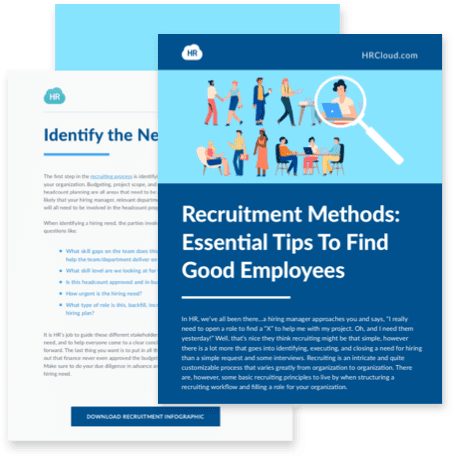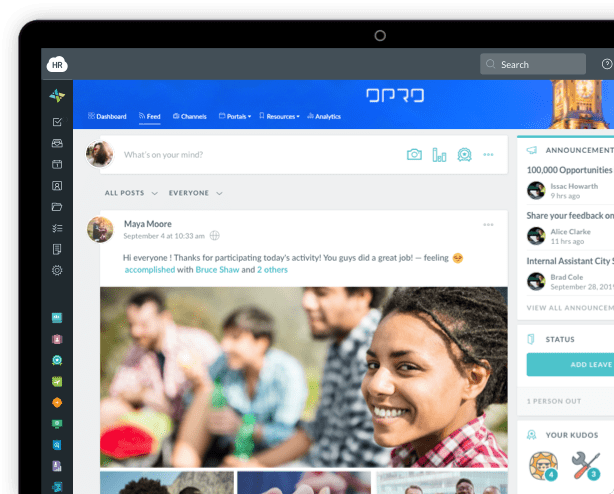Hiring mistakes are made all the time. A candidate looks great on paper, provides an amazing performance during the recruitment process; but, once on the job, that great candidate turns out not a good fit. You scratch your head and wonder, “what happened?”
Often, it is not your fault, other than you believed a candidate’s answers when they were not honest. But, sometimes, it comes down to asking the right questions in the right way, in order to dig a bit deeper into skills, personality, and improving your overall working style.

To learn more about recruitment methods, download our ebook now.
Download nowHere are some interview suggestions that you may avoid those occasional mistakes and conduct the job interview to hire the best candidate.
Spend Time Crafting That Job Description
It’s a no brainer to include the required and desired skills and experience as well as the talents in a job description. There is a number of content writing services out there with pros that can write creative and engaging job descriptions. But what do you do beyond that when you craft a job description?
-
How creative are you in developing that job title? If your title calls interest, you will engage more readers right from the beginning and that results in hiring the best candidate. Make sure you have included a few keywords so as to be found in Google searches.
-
How much are you telling readers about you? Brag about your organization, tell about your great company culture or other things that set you apart. Be creative as you tell this story. No one likes boring anymore. It’s okay to be casual and even a bit humorous, if it fits your organization’s voice. Those who appreciate this are probably the right kinds of candidates. When websites like Trust My Paper advertise for writing positions, for example, their job descriptions can run as long as 200 words. There is a number of writing services out there with pros that can write creative and engaging job descriptions. You can look at All Top Reviews and read about top writing services with departments that can do this for you.
Now, on to Those Interview Questions
So you’ve done your homework: created a great job description, uploaded it to your ATS software to track the results and now you have candidates waiting in your pipeline to be evaluated during the next stage.
First and foremost, write out your questions in advance. This doesn’t mean you will use all of them during the hiring process. But it does bring consistency as you evaluate the candidates you have selected for interviews. And, take notes. This is how you can compare their answers later on and keep the candidates straight in your head. Having a certain structure to your questions will also help for a good interview.
Here are 6 questions that should get to the “meat” of a candidate for the job and allow you to make a good final decision.
1. Tell me about yourself. This, of course, is really open-ended, and it should be. You want to get a feel for what the job seeker believes are the most important things in his life. Pay attention to one’s beliefs, values, and priorities. Often, you can get a “feel” for their fit for your environment and culture.
2. Why do you want to work for us? This question is important because it will show you whether the candidate has taken enough initiative to research your organization and have learned something about the potential employer’s mission, culture fits, etc. It’s a bad sign if the answer only relates back to the job description and his qualifications.
3. Describe your strengths. Of course, you want those strengths to relate to the skills of the position opening but look for strengths that go beyond just hard skills. Do you need a “people person?” Will this position involve working closely with a diverse group of others? Does it involve leadership roles? If so, what is their approach to leadership? You can continue to ask sub-questions as they address this question, to hone in on the specific strengths you want. And always ask for examples as they go along.
4. Tell me about a failure you had and how you responded to it. Behavioral interviewing has become a common tool for determining how a person is likely to deal with a challenging situation. This question can be either professional or personal. What you are looking for is how they reacted and what steps they took to mitigate the failure or to move on afterward and stay productive. It’s the process you are looking for, not the details of the event.
5. Why do you want to leave your current position? You want valid reasons here – career growth perhaps. Beware of candidates who complain about their current position, their supervisors, team members, etc.
6. Describe your greatest career success. Here you want detail. If you don’t get it, ask for it. You want them to give real results.
Some Additional Tips
1. Spend More Time Listening than Talking.
Candidates are nervous during job interviews. It’s easy to take command and do a lot of talking yourself. Don’t do it. You need to ask questions and wait for answers. It’s okay for a candidate to take some time to think about an answer before responding. Tell him that’s okay. Force yourself to be quiet and listen.
2. Spend Some Time Digging into Job Hopping
Job hopping is more common than it used to be. So, do not see it as an upfront negative. But do explore frequent job changes during the candidate’s work history, to be certain that those changes were not because of issues with bosses, co-workers, etc. The candidate will bring that work experience into any new job. Consider getting in touch with your potential employee’s former hiring managers to ask questions and make thorough reference checks.
3. When Possible, Hold Peer Interviews
You are not the person who will work with this new hire on a daily basis. And your opinion is not the only one that counts. The need for peer interviews is really necessary. And they should have the power to come up with their own questions for the job candidates. They know what they need and want, perhaps more than you. If, for some reason, this is not possible, at least gather interview questions from them, be certain to ask those questions, take notes, and share the responses.
Final Words
If you have an engaging job description, have screened the job seekers well, and done the right pre-planning for the interview process, you can improve your chances to hire the perfect candidate in the end.
About the author:
Daniela McVicker is a career expert and an editor at Top Writers Review. She’s also a business communication coach, helping future job applicants to achieve success on their career paths.

Keep Reading
The Most Common Hiring Mistakes in the Healthcare Industry
The hiring process can be tedious in the healthcare industry, and it may be tempting to
Remote Onboarding Success Stories
When it comes to onboarding new hires, many companies understand the value and benefits


